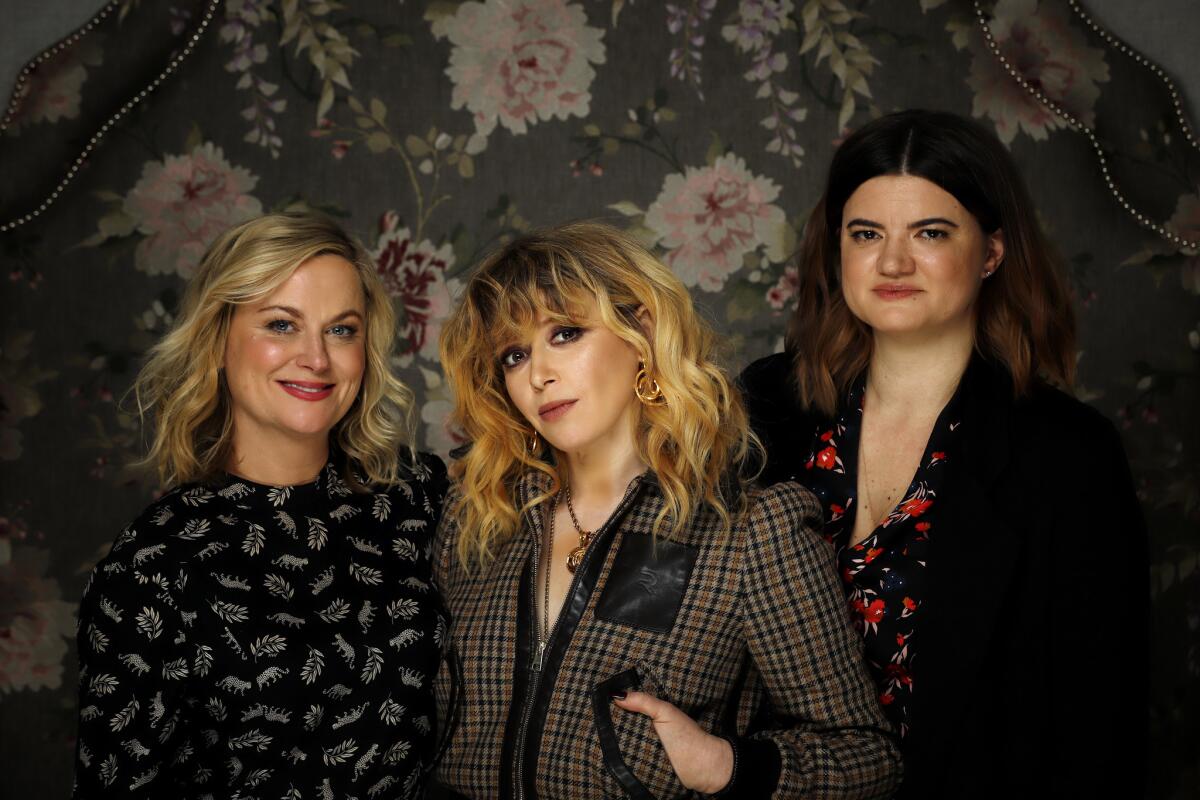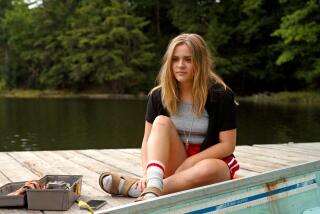‘Russian Doll’: Natasha Lyonne, Amy Poehler and Leslye Headland dissect their trippy Netflix comedy

What if you kept dying at your own birthday party?
That’s the darkly comic premise of “Russian Doll,” a Netflix series starring Natasha Lyonne as Nadia, a fast-talking, freewheeling Manhattanite caught in a mysterious loop in which she keeps dying in nightmarish New York scenarios: blindsided by a speeding cab, falling down an open cellar door in the sidewalk, crashing in a broken elevator.
And each time she gets killed, Nadia wakes up, not in the afterlife, but in the bathroom at the party for her 36th birthday, only to start the process all over again. Nadia’s increasingly elaborate quest for survival leads her on an adventure through the bodegas and dive bars of the East Village, but, ultimately, within herself as she peels back the layers of her identity to confront buried trauma.
With its trapped-in-a-loop conceit, “Russian Doll” is initially reminiscent of “Groundhog Day” or the more recent “Happy Death Day,” but over the course of eight episodes premiering Friday, it evolves into something without obvious precedent — a visually inventive existential noir comedy told from a female perspective.
Created by Lyonne, Amy Poehler and writer-director Leslye Headland (“Bachelorette,” “Sleeping With Other People”), the series boasts an all-female writing and directing team. Lyonne, who directed the final episode, recently met with her co-creators in New York for a boisterous (and occasionally off-topic) conversation about the series, its origins and their influences.
Tell me about the inspiration for the series.
Lyonne: Amy, who I’ve known for probably 15 years, called me out of the blue one day, and she was, like, “So as long as I’ve known you, you’ve always been the oldest girl in the world.” I was, like, “What is this, a compliment?” And then she’s, like, “I think we should make a show about that. What do you say?” And I was very excited. And then, we made that show, “Old Soul” [a pilot for NBC].
And when it didn’t go, Amy turned to me and said, “If we could make any show in the world, without any restrictions, what would it be?” And that was sort of a jumping-off place for discussing what was going to become “Russian Doll.”
What we landed on was this idea of this choose your own adventure — if you could go to the same party every night, and you could take home a different person from the party. I remember showing up at the writer’s room on day one with Victor Frankl’s “Man’s Search for Meaning.” And everybody looked at me, like, “You know that’s not how you make a show, right?”
What we were after was discovering what it would mean to have limitless options, and what kind of circle of hell that might become.
Poehler: The women I work with and know are really, really complicated women. That’s the thing I’m most proud of. So we wanted to show a female character getting to live the width and breadth of life. Tony Soprano is allowed to be all things. And I think of Natasha as my Tony Soprano.
Lyonne: Look at this outfit, you know? [Lyonne gestures towards her gold medallion, houndstooth jacket and pants.] Amy was the one who titled the show “Russian Doll.” It was this revelation. We kept talking about — who are we in our outermost and innermost selves?
Poehler: And can you ever get to the littlest one? And when you take off and you’re, like, look at how little the littlest one is, and who do you show that to? And how quickly do you put that back in, and restack? That became a metaphor.
Lyonne: Leslye kept saying, “If we do this right, it should feel like a four-hour movie that you immediately have to start over, to try and answer the questions you didn’t realize you were asking in the first place.”
Headland: I feel like the best noirs, movies like “The Long Goodbye” or “The Big Lebowski,” when they’re done you’re, like, I’m so sorry; I have to watch that again, because I was watching the plot. And that’s actually not what this was about.
What makes you describe Natasha as an old soul? The series really is a showcase for her.
Poehler: Well, Natasha’s lived many lives. She is one of my favorite actors, and I think that this show is a complete tour de force from beginning to end. In showing her range, in showing her vulnerability and showing her real, true comedy chops. It’s very hard to have those three.
Headland: My wife is also on the show. She came home and was, like, “I just want you to know, Natasha is a much better director than you are. Here are some pointers that I learned from working with her.” I was, like, “Thanks babe. Thank you so much. Thank you.” She’s not wrong.
Lyonne: A shorthand existed that I’ve never experienced in my life as an actor. It was a very special situation, in a deeper, more vulnerable sense that I’m reluctant to talk about. It was so hugely personal to me, and this thing was my baby, and my whole life story in a way — fictionalized, but encapsulated in a very deep personal, often painful, way. It was very special. It felt like the ‘70s.
Poehler: That’s the highest compliment from ‘Tash: “It feels like the ‘70s.”
I think of Natasha as my Tony Soprano.
— Amy Poehler
Most of the series is set at night. How disorienting was it to film?
Headland: My first film, “Bachelorette,” was almost all night shoots as well. New York is kind of a city where you can shoot at night, and you’re going home at 7:30 a.m., and it feels kind of normal.
Lyonne: We were shooting so close to my apartment that I just walked home with my little director’s binder at the end of the day, watching the sun come up, knowing that I’d just come from a wild day with Burt Young [who has a supporting role], a hero from “Rocky” and “Once Upon a Time in America,” being, like, “Holy hell. How did this become my version of watching the sun rise in the East Village?” I was used to a very different version of that, historically. So it was deep.
Poehler: “Russian Doll” talks about that exactly, which is, what is your version of heaven and hell? What is the thing that you have to live over again, and what are you supposed to learn each time?
At first, Nadia dying over and over again is darkly funny, but as the series progresses, it becomes harder to see it happen. You want her to live.
Headland: It’s very rare that you get to work on something with a female protagonist where you’re rooting for the character from an existential, spiritual place, as opposed to, “Oh, I hope she gets that guy.” Or, “I hope she gets the job she wants.” Nadia is not just going through an existential or spiritual crisis; she’s also going through a journey backward, and trying to figure out, wait a minute, when did this start? When was the moment where things kind of got off course? What’s the deep thing that needs changing, so that she can break this cycle and stay alive?
Was the show’s all-female creative team intentional, or just a happy accident?
Poehler: It’s simply that we have so many women we love to work with. And it’s funny, we’re really proud of it. As it was happening in real time, we were, like, this is exciting. But also for me, it’s a very selfish choice to work with women, because I’m totally inspired by their creativity, and I like working with them.
Lyonne: I remember us kind of hitting a tipping point, where it was already the three of us, and we were kind of, like, also let’s get [director] Jamie Babbit. Then we had [a number of women] in our writer’s room. And suddenly we were, like, wait a second, uhhh, so I guess we’re kind of good? Maybe we should lean in, because we’ve accidentally already done it. It’s pretty special.
Poehler: We can take credit for [hiring all women] but also, we just went for the best people.
Lyonne: And we love men. I’ve slept with many. [Laughter.] Knowing 90% of the time that Leslye and Jamie were back there at the monitor, there wasn’t this extra layer of, “Are you going to like it?” It was more that we were just on the same page. And so I think that there was a real freedom.
Poehler: It’s just a layer of translation that you don’t have to deal with. I would highly recommend all females, as much as you can. It’s so great to be around.
Lyonne: Also, one surefire way that you guarantee that you get stories that haven’t been told before is, put them in the hands of people who haven’t had the opportunity to tell them. Just selfishly, if you want the most original product, let somebody’s voice out there who hasn’t said it yet.
How did you keep track of the various loops of the story? Did you have a great big conspiracy board?
Lyonne: The poor script supervisor on this show. My god, what she had to do. At our production meetings, we’d be, like, “You guys don’t understand the loops and the timelines? A1 and A4?” It was basically like a war room. I’ve never seen that Benedict Cumberbatch movie where he invents math, or something, but it was basically like that movie.
How do you feel about the “Groundhog Day” comparisons?
Lyonne: In a loose way, I’d described [the show] to friends and family — I don’t really have family, that’s a lie — but I would sort of describe it, if I was in a rush: “Yeah, it’s ‘Groundhog Day’ meets ‘No Exit.’ All right, see you later.”
Headland: I am going to say something that’s a little controversial: I’ve noticed as a human woman, when I end up doing press, I’m consistently reminded of how my work is like something else. It feels like they really want to remind me that this genre already exists, and that it was already done by a man. And I’m, like, “Yes I know. I’m very aware of that stuff.” When “Breaking Bad” comes out, no one’s, like, “You know, Jenji [Kohan] already did this with ‘’Weeds.’ ” When “The Sopranos” debuts, they don’t go, “I’m so sorry, David Chase. We already did ‘Goodfellas.’ ”
There’s this understanding that the artist has taken that into consideration, and knows what they’ll be referencing, and how that will affect their audience. Of course we thought about that. Of course we knew that that was a reference. And we wanted to move past it.
See the most-read stories in Entertainment this hour »
‘Russian Doll’
Where: Netflix
When: Anytime, starting Feb. 1
Follow me @MeredithBlake
More to Read
The complete guide to home viewing
Get Screen Gab for everything about the TV shows and streaming movies everyone’s talking about.
You may occasionally receive promotional content from the Los Angeles Times.






